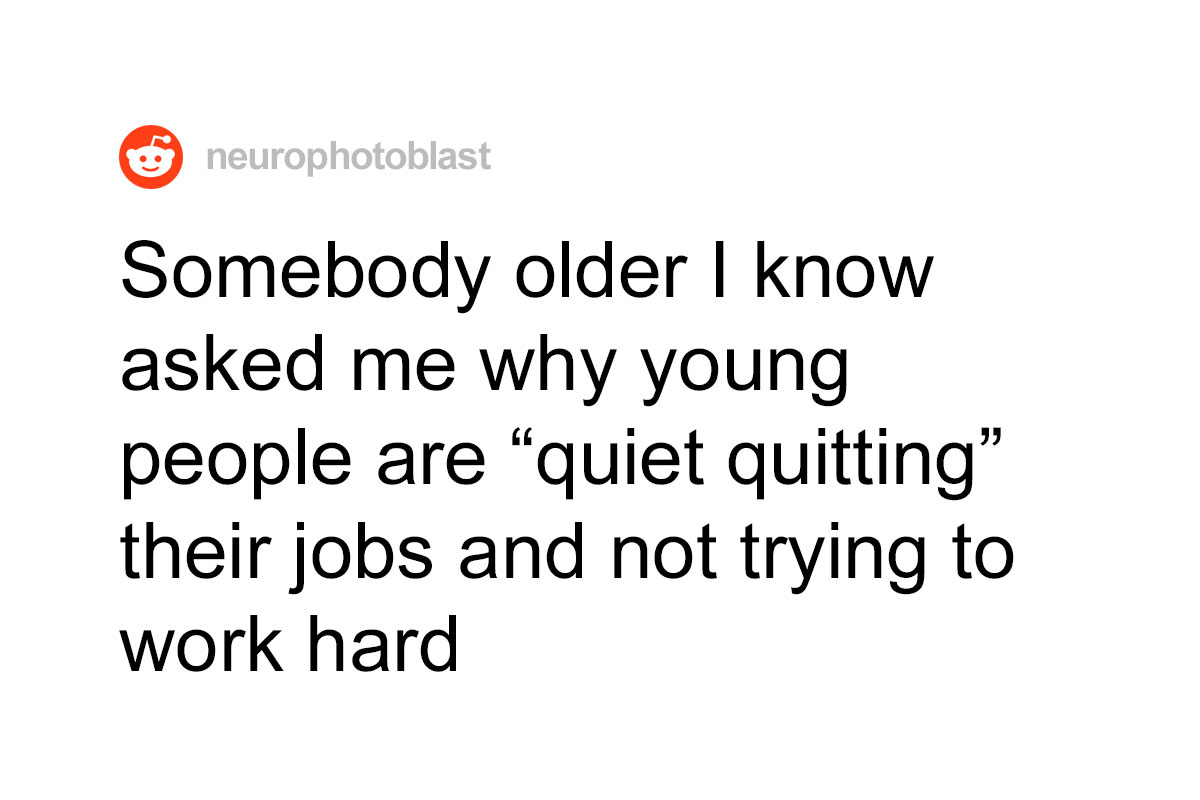
Hustle Culture Is Becoming A Thing Of The Past, Making Older Generations Confused, But This Person Gives A Very Simple Explanation
InterviewIt’s only fair to expect proper compensation for the work you do. And while extra effort might have been the way to success back in the day, nowadays it rarely reaps the same benefits.
Redditor u/neurophotoblast told the ‘Anti Work’ community about talking to an older person about it. The latter asked why young people are not willing to hustle more and choose ‘quiet quitting’ instead. The redditor explained it with one simple yet valid argument. Scroll down to find it in their own words.
Bored Panda has reached out to the OP. They were kind enough to answer a few of our questions. You will find our interview with them below.
Walking the extra mile nowadays might not be as beneficial as it was back in the day
Image credits:Nataliya Vaitkevich (not the actual photo)
This person explained why young people choose not to bend over backwards at work
Image credits: Alexander Mils (not the actual photo)
Image credits: neurophotoblast
Nowadays people are less willing to work themselves to the bone without proper recognition or compensation
‘Quiet quitting’ is a term that typically refers to doing no more than what your job description requires. Or the bare minimum, to put it simply. According to Gallup’s data, back in 2022, quiet quitters made up as much as 50% of the workforce in the US. The rise of such a trend, also known as ‘soft quitting’, shows that people are no longer willing to work themselves to the bone. At least not without proper compensation that would correspond to their extra time and effort.
“‘Hustling’ makes less sense these days in many cases because the increase in potential or realized rewards is not enough to offset the increased work demands,” u/neurophotoblast told Bored Panda. “Think about it- the economic situation is dire and people are working long hours and multiple jobs for low wages. At some point, working an extra hour or two comes at a very high cost. An increase from 40-45 hours per week is a lot more manageable than 70-75.”
“In addition, the increase in pay is very low or even non-existent. Why make that tradeoff? It’s not worth it. Cost of living is too high and salaries are too low. Average employee to owner/CEO/high level manager pay ratio is way too low. People know they are being taken advantage of, and that they are not the ones reaping the rewards from their extra work. It is far more profitable to look out for yourself by moving between jobs often rather than grinding at one company. Company culture can increase genuine attempts to ‘hustle’ and contribute, but this comes at the very real cost of respecting and rewarding your employees,” they added.
Image credits: Karolina Grabowska (not the actual photo)
The term ‘quiet quitting’ first gained popularity online, predominantly on TikTok
The term ‘quiet quitting’ first went viral after Bryan Creely, a Tennessee-based corporate recruiter and career coach, uploaded a video on TikTok with a description reading, “More people are ‘quiet quitting’ instead of leaving”. In the video, he discussed the topic in the background of an Insider article written by Aki Ito, about employees deciding to take it easy at work instead of quitting it altogether.
The trend was fueled by another TikTok video, uploaded by an engineer from New York, Zaid Khan. Speaking about ‘quiet quitting’, he said, “You’re still performing your duties but you’re no longer subscribing to the hustle culture mentality that work has to be your life.”
The OP believes that such wording for this exact idea shouldn’t exist. “The term is designed to weaponize the connotation of quitting as a bad thing, and enables a war of ideas based on semantic distinctions,” they said. “When you fulfill the conditions of your contract, that is working, in the most technical sense. There is nothing in that which would justify the word ‘quitting’. The implication is that part of work is the unspoken agreement that you will do more than what you agreed, which is predatory and introduces vague and undefined notions about what work really is.”
They expanded on the idea: “That leaves everything up to interpretation from managers and bosses. Such interpretations can only benefit in one direction (in the direction of the one who has power). Working, as a concept, implies the exchange of time, expertise, or results, for money or other rewards, as defined by a contract. Fulfillment of the agreement being framed as quitting is therefore disingenuous.”
Image credits: Sam Lion (not the actual photo)
Hard work often leads to fatigued employees, yet older generations might still think that the youth doesn’t put enough effort into it
In an article for GQ, organizational psychologist Dr. Maria Kordowicz pointed out that our professional and personal lives are quite intertwined. That’s why it’s no surprise that burning the candle at both ends often negatively affects a person’s life outside of work. For that reason, some people make the conscious decision to take a step back and focus more on their well-being instead of pushing themselves to the limit and risking burnout. According to Gallup, roughly three in four employees have experienced burnout at some point in their careers.
Dr. Kordowicz also revealed that there are negative connotations that accompany the term of quiet quitting, which have led to people being called ‘snowflakes’ or deemed lazy. In the redditor’s story, the representative of the older generation said the youth is not working hard enough, which doesn’t really sound like a compliment either. Such words show that nowadays, people are often expected to work hard even if that means exceeding the duties on their contract of employment.
“Every generation thinks the next one is lazy, this is a well-documented psychological phenomenon. Part of it could be related to how people remember things. Difficult experiences are more likely to be remembered and recalled, so there is a bias to remember yourself as more hard-working than you actually are when looking back,” the redditor pointed out.
“In addition, changes in processes can give the impression that people are lazy, when in reality they are dealing with other issues. A calculator doesn’t make a mathematician more lazy just because he does less calculations by hand, it just means he can spend more time working through complex problems without having to do that. As it is with modern life. Maybe you don’t have to do the cliched walk 10 miles to work like your granddad, but that doesn’t mean that when you sit in front of your computer coding all day, as an example, that it cannot be considered hard, or work.”
The OP responded to some of the things fellow redditors had to say
People shared their insight and stories in the comments
I remember reading about Japanese bus drivers going on strike but they did something completely different. They did their routes as normal but they let everyone on for free. So passengers didn't have to pay for their journeys. They wanted to hit the company pockets but not disrupt people just trying to go about their day.
Quiet quitting is leaving your company without saying a word. Only doing what your contract tells you to do is literally doing your job.
Yes, exactly. And they can do just their job and in 20 years they'll still be doing the same job. Don't work to expectations and expect to be demoted. Work beyond expectations, doesn't have to be all the time, they'll get noticed and get promoted.
Load More Replies...The more articles I read about this on bored panda, the more angry and worried about my future I become. Our future is in peril and I am scared. - A schoolgirl
Nope, I have faith in the younger generation.
Load More Replies...I remember reading about Japanese bus drivers going on strike but they did something completely different. They did their routes as normal but they let everyone on for free. So passengers didn't have to pay for their journeys. They wanted to hit the company pockets but not disrupt people just trying to go about their day.
Quiet quitting is leaving your company without saying a word. Only doing what your contract tells you to do is literally doing your job.
Yes, exactly. And they can do just their job and in 20 years they'll still be doing the same job. Don't work to expectations and expect to be demoted. Work beyond expectations, doesn't have to be all the time, they'll get noticed and get promoted.
Load More Replies...The more articles I read about this on bored panda, the more angry and worried about my future I become. Our future is in peril and I am scared. - A schoolgirl
Nope, I have faith in the younger generation.
Load More Replies...
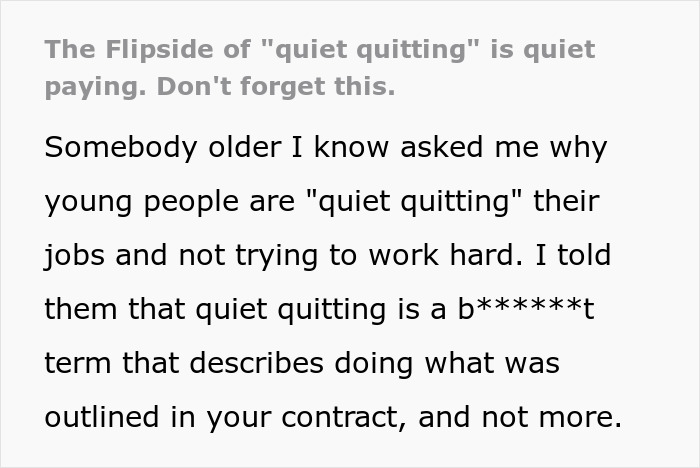
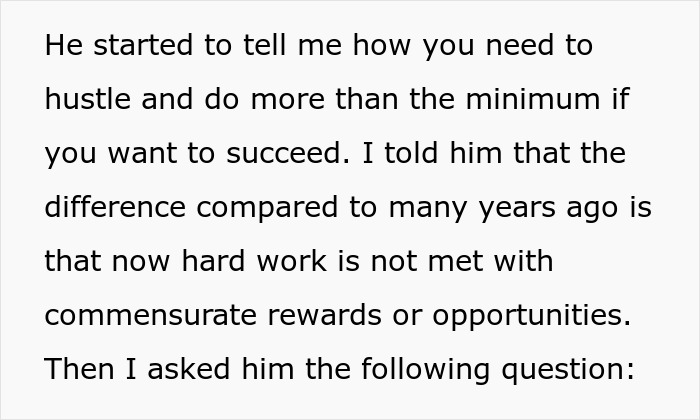

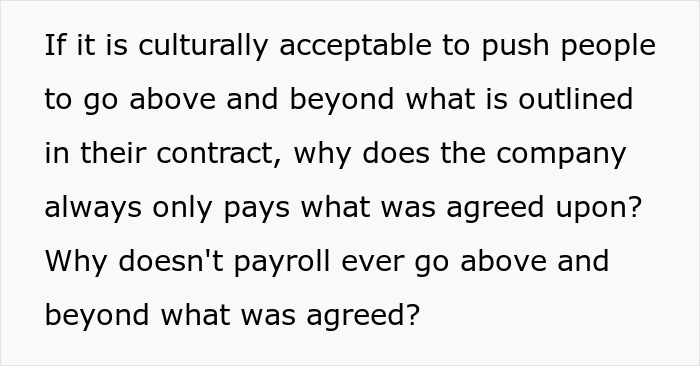





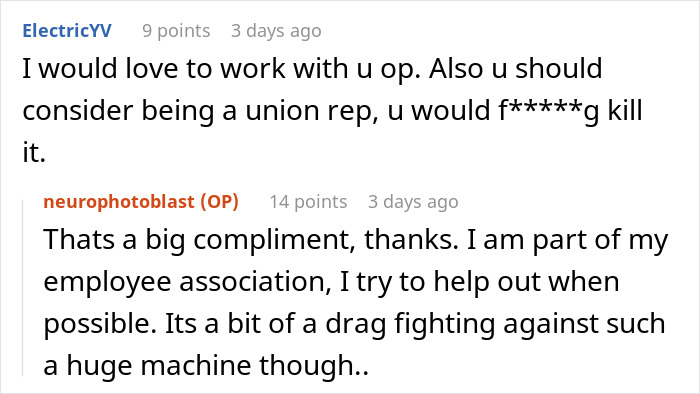
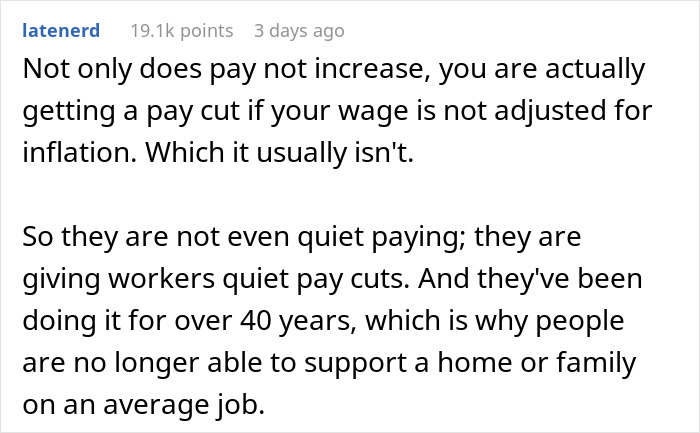
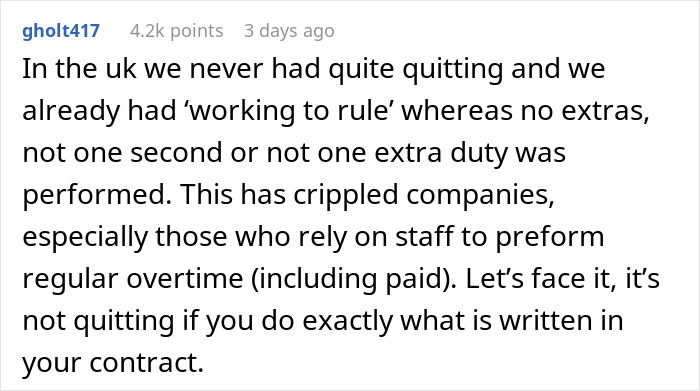
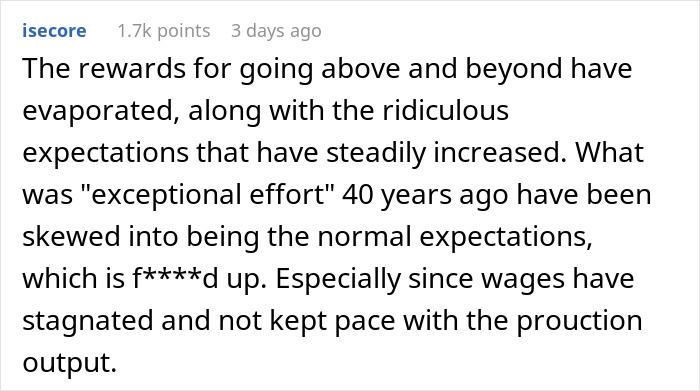



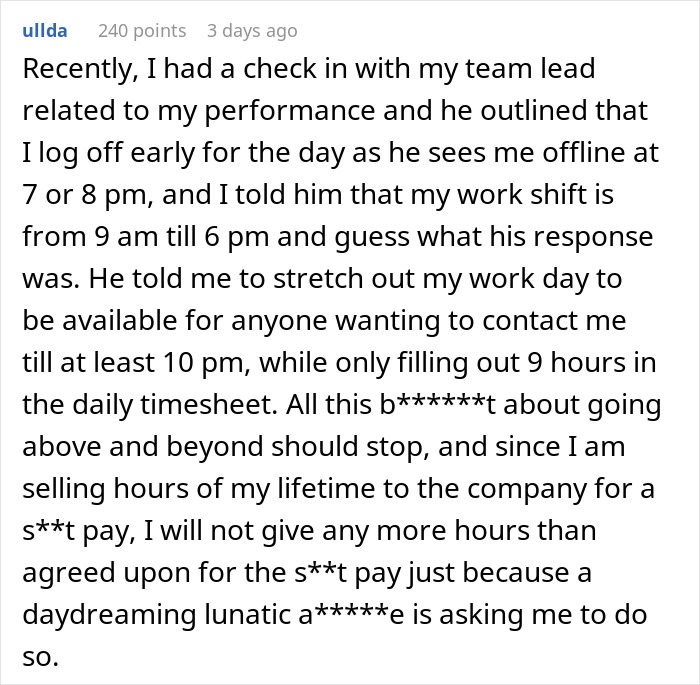
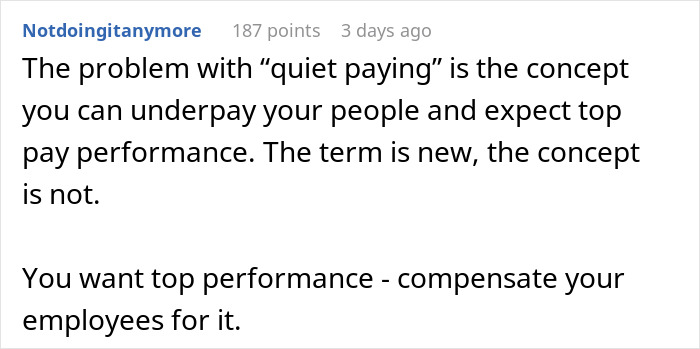
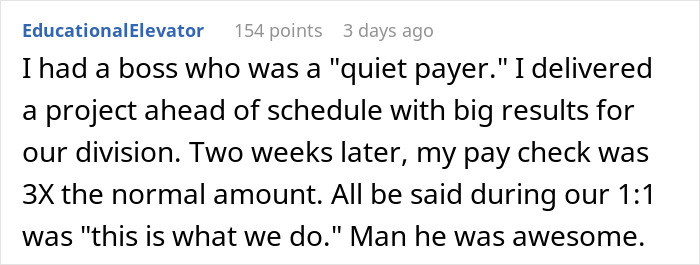
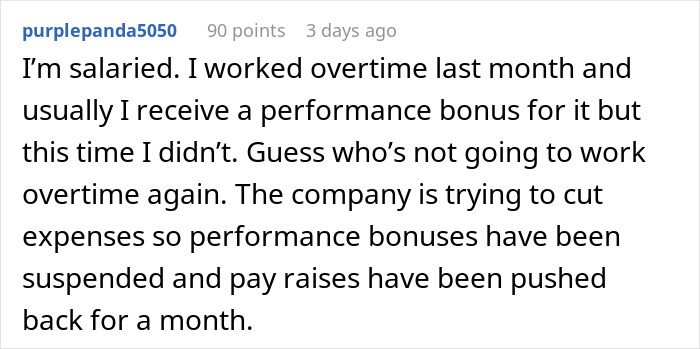

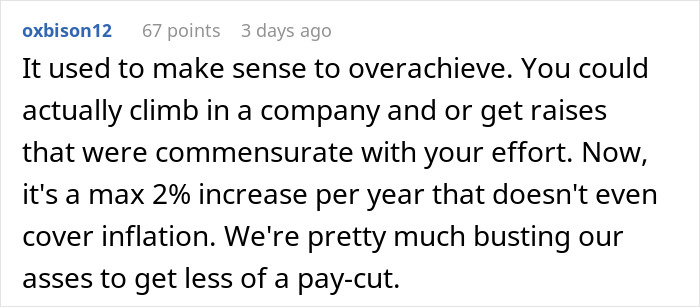
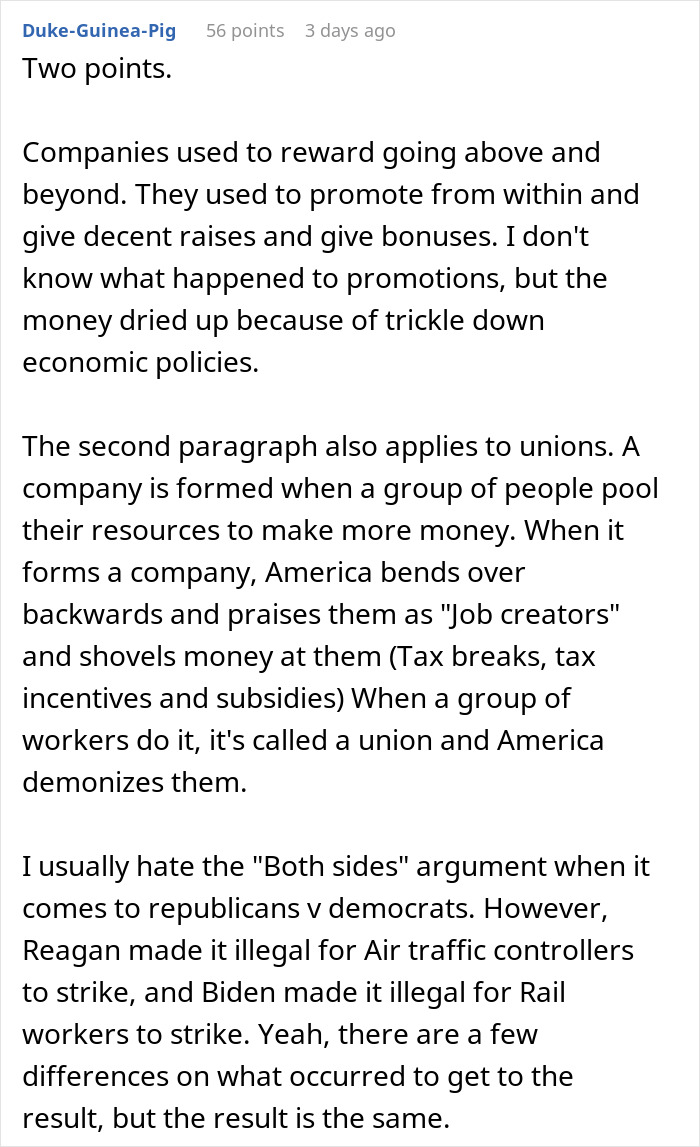
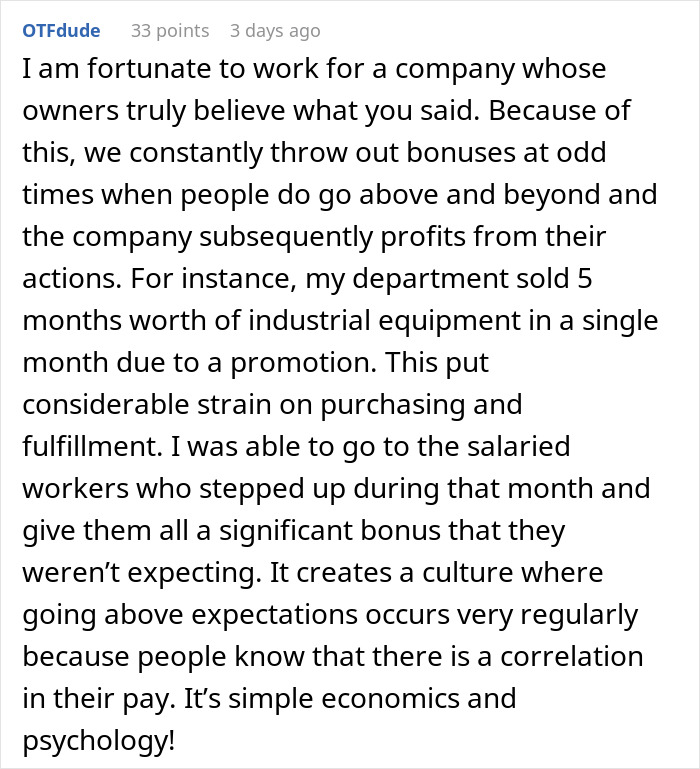



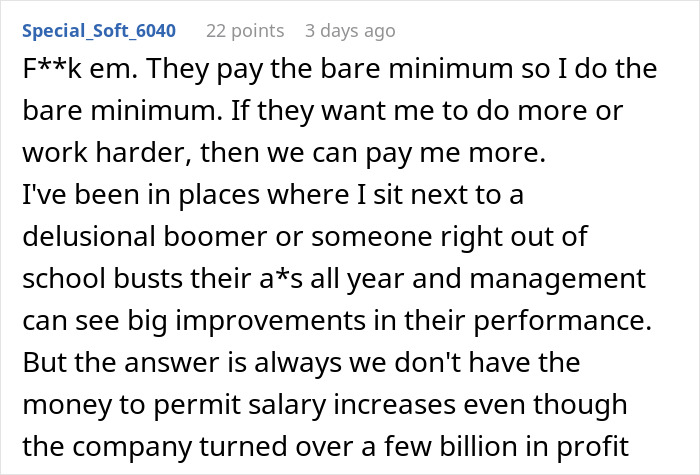






74
66